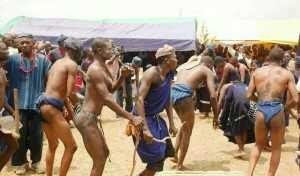While speakers of the dialects were loosely called Gwari by both the Hausa Fulani and Europeans during pre- colonial Nigeria they prefer to be known as Gbagyi. Gbagyi is the most populated ethnic and indigenous group in the middlebelt and Federal Capital Territory of Nigeria and their major occupation is farming.
Royalty is abased by gbagyi people because it's believed that kings have abilities to interact with gods. So every king who is about to die is always aware of his death before hand and makes preparation for the tragedy. This belief comes from the initiation kings go through before coronation. A king is kept in a dark room for seven days where he is not allowed to see the sun. If he survive this period , he is then groomed as a King and if he doesn't , people believe he was not chosen by the gods.
Though Christianity has taken over the culture but many still practice this traditional rite on kings .
After a King's death, women are not allowed to see the King's death body, if they do, the entire community suffer lost of young ones and a barren land that year. And sometimes they could hunt down every female that saw his death body, the burial is always carried out at night, youths are asked to go home and just elders stay behind to bury him.
The grave is not dug the normal way, an underground hole is dug where it's constructed as a living room with a parlor and his chair is taken inside where they sit him down and restrict sand from touching his body . People are not not allowed to cry , if they do, it becomes a curse to the land. People can cry only after 1 year .
Rainfall is a sign of a King's death , it rains heavily Everytime a king die not minding the season, both in the raining and dry season, water drops . This notify the neighbouring villages that a king has died.
Keeping the King's body till the next day is an abomination and is also an abomination to keep a King body in a mortuary. He is buried the same day he dies.
